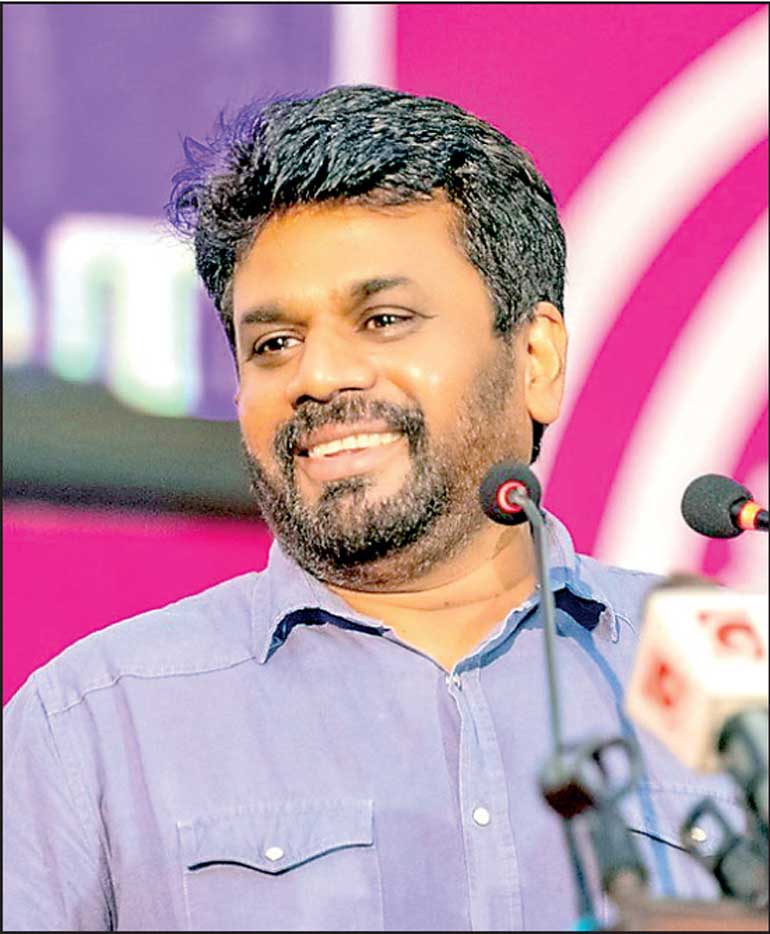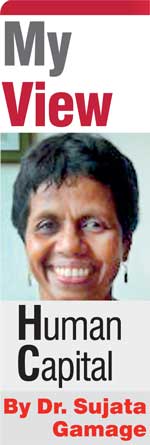Monday Feb 16, 2026
Monday Feb 16, 2026
Thursday, 19 September 2024 00:30 - - {{hitsCtrl.values.hits}}

Anura Kumara Dissanayake
 As it turns out, the winning proposition of the NPP is the new political culture they hope to usher in.
As it turns out, the winning proposition of the NPP is the new political culture they hope to usher in.
According to the interview of Anura Kumara Dissanayake (or AKD) of the National People’s Power (NPP) party carried out by Kalindu Karunaratne of Ada Derana on 16 September, NPP has all but conceded the economic issues. What remains is a new political culture of austerity, self-sacrifice and accountability which leaders will demonstrate, and others will emulate. The new political culture is expected to catalyse the socio-economic changes needed to take the country forward.
The good news for the country and the bad news for NPP is that the political culture has changed and will keep changing, with or without the NPP. Further changes will happen not because of a cadre of austere and self-sacrificing politicians, but institutions, laws and economic realities, and social norms driven by these.
A technical definition of a political culture can be something like “a set of shared views and normative judgments held by a population regarding its political system. As a proxy for a broad category like “a population”, it is useful to see how political culture is manifested through the activities of politicians, the media, and citizens.
Process of change in Sri Lanka’s political culture has been incremental and will continue to be incremental. The economic crisis has done more than anything else to give a boost to the change process. I will look at the behaviour of the three segments of the population in terms of gradual but significant changes observed, beginning with media.
Signs of professionalism in media – as per AKD interview of 16 Sept.
Some of the darkest moments of TV journalism was when Ada Derana took the lead in condemning Dr. Shafi, a gynaecologist, on hearsay, for purposely making Buddhist women infertile. And then came the snake in Kelani river incident where the channels exploited the gullibility of voters to promote their preferred candidate.
This election, the very same channel showed us what true TV journalism can be. In the AKD interview of 16 September on the 360-program at Ada Derana, young journalist Kalindu Karunaratne came well prepared and helped the listeners understand where exactly AKD stood on policy matters, and led AKD to give straight forward answers.
Will NPP uphold or overturn the Central Bank Act intended to prevent the executive from compelling the Central Bank to print money, among other things? No, the NPP will not overturn the Act but there will be continuing dialogue between Treasury and Central Bank.
How much of the budget do they expect to cover by recovering evaded taxes or taking away privileges of politicians? AKD admitted that recovering back taxes is a long process. Of the 1,066 billion taxes that are pending, only 10% is in default and the rest is currently in litigation, and due process must be allowed. As for taking away privileges of politicians, AKD admitted that it will save no more than Rs. 2 billion and will not make a dent in the budget. It will be largely a symbolic measure to create a different political culture.
How will they fund the 104 billion in taxes that they expect to forgo when they reduce VAT and PAYE taxes as promised? AKD promptly responded by noting that the income tax department has collected 150 billion in additional taxes this year due to increased economic activity and expansion of the tax net. AKD may not have realised, but the listeners were left wondering what is new from NPP, when the gains are due to the present Government’s policies.
How will the NPP change the IMF agreement? No, they have no intention of endangering the economy by calling for radical changes. Their focus is on changing the parameter of reaching a debt to GDP ratio of 95% by 2032. Pressed to elaborate why that will not lead to renegotiation of all the agreements made so far, AKD had to admit that all they can do is make “an effort” and let go after a while. What would happen in the meantime was left for the listeners to imagine.
The interviewer could have probed more but the questions and answers gave enough material for the listener to decide, I feel. More importantly, we saw a new standard for TV journalism.
Fact check culture in social media
Social media is a haven for fake news and deep fakes, but users are getting smarter. For example, now it is customary to forward news with the warning “forwarded as received”. Fact checks are quick to appear and shared in the same media.
Awareness of voters as taxpayers
Today, the politicians may make promises, but people are more discerning about costs. Thanks to the economic crisis, budget terms such as Income, primary expenditure or expenditure before interest cost, the primary deficit or gap between the two, and the need for borrowing to close the gap are common knowledge. Fiscal responsibility to keep borrowing to health limits is expected.
As Ranil Wickremesinghe said at a rally, he thinks his Government can collect 5.1 trillion in taxes and expects to borrow 1.8 trillion. The Government is limited by the IMF agreement to limit borrowing to a maximum of 5% of the projected GDP of 35 b. That leaves his Government Rs. 6.9 trillion to spend and his proposals are within that. What does his opponents have to say, he challenged.
This is a far cry from his own budget speech or budget speeches of the past where the public is showered with budget promises which are nothing more than window dressing and never amount to more than 5% of the total budget. Last year, the headline grabbing expenditures amounted to 216 billion or less than 5% of the project expenditure of 4.4 t. The media too swallows the sweeteners and devotes their front page to these items, when 95% of the budget is hidden behind allocations for individual ministries and agencies.
As an improvement to the process, the treasury published a post–budget document titled Budget 2024 – for What and for Whom, which tells us in plain language the full picture of the projected primary expenditure of 4.6 trillion expenditure. For example, the report showed how the primary expenditure is distributed across 12 sectors such as Agriculture, Education, Defence and so on, and details for each sector. This kind of disclosure should become the norm and be made available along with the budget speech.
Asset declarations and empowered Bribery Commission
For the first time in our electoral history, we can go online to https://ciaboc.gov.lk/ to view the asset declarations of our candidates. Currently, this facility applies to candidates who are politicians or Government officials but that can be corrected.
The Commission to Investigate Allegations of Bribery or Corruption (CIABOC) too is newly empowered with an amended Act which gives it powers to prosecute without going through the Attorney General’s Department, for example. Some candidates have wrongly promised to do this same thing when it is already in the works.
Much can be done to prevent corruption in the future, if the Government allocates sufficient funds for CIABOC and we use the tools provided by the commission effectively.
Sectoral oversight committees in Parliament
Finally, the system of Sectoral Oversight Committees (SOCs) in Parliament is a little-known structure that can make the executive more accountable. The constitutional Council is the better-known example. The SOCS have wide ranging powers to investigate pending legislation, progress of past legislation or propose new legislation. By standing order, the minister of deputy minister for a sector cannot be the chair of such committees and by convention at least half of the chairs shall be from the opposition.
We need more institutions and laws like these to make any elected politician or appointed official accountable. Expecting individuals to be exemplars will only lead to disappointment.